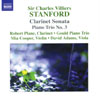Stanford Clarinet Sonata
Dashing performances for minimal wallet-damage – why are you waiting?
View record and artist detailsRecord and Artist Details
Composer or Director: Charles Villiers Stanford
Genre:
Chamber
Label: Naxos
Magazine Review Date: 13/2007
Media Format: CD or Download
Media Runtime: 74
Mastering:
Stereo
DDD
Catalogue Number: 8 570416

Tracks:
| Composition | Artist Credit |
|---|---|
| Sonata for Clarinet and Piano |
Charles Villiers Stanford, Composer
Benjamin Frith, Piano Charles Villiers Stanford, Composer Robert Plane, Clarinet |
| (2) Fantasy Pieces |
Charles Villiers Stanford, Composer
Alice Neary, Cello Charles Villiers Stanford, Composer David Adams, Viola Lucy Gould, Violin Maria Cooper, Violin Robert Plane, Clarinet |
| (3) Intermezzos |
Charles Villiers Stanford, Composer
Benjamin Frith, Piano Charles Villiers Stanford, Composer Robert Plane, Clarinet |
| Piano Trio No. 3 |
Charles Villiers Stanford, Composer
Charles Villiers Stanford, Composer Gould Piano Trio |
Author: Andrew Achenbach
Spooky: no sooner had I dug out Thea King’s affectionate 1980 Hyperion recording of the Stanford Clarinet Sonata following the sad announcement of her death in June than Robert Plane’s new version dropped on the doormat. The work is one of Stanford’s strongest achievements from his later years, boasting at its heart a powerful Adagio (“Caoine” – an Irish lament) which finds Plane even more responsive to the music’s raw emotion and beaming fantasy than either King or Emma Johnson. Ravishing in tone and exploiting an excitingly wide range of dynamic, Plane forges a commandingly articulate alliance with pianist Benjamin Frith. Indeed, it’s hard to imagine more sympathetic music-making – a statement which also holds true for the Three Intermezzi (an exceedingly attractive trilogy dating from 1879) and the two substantial, utterly disarming Fantasies for clarinet and string quartet, written in 1921-22 for use by students towards the end of Stanford’s 40-year stint as professor of composition at the Royal College of Music.
As if all that were not enough, we’re also treated to the world premiere recording of the last of Stanford’s three piano trios. Completed in 1918, it’s a tautly constructed, urgently communicative piece dedicated to the memory of the two sons (victims, both, of the Great War) of Alan Gray, Stanford’s successor as organist of Trinity College and conductor of the Cambridge University Music Society. Again, the performance is absolutely first-class and, with sound that is at once intimate and true, this valuable anthology can be welcomed with open arms. Naxos’s absurdly modest asking-price is the icing on the cake!
As if all that were not enough, we’re also treated to the world premiere recording of the last of Stanford’s three piano trios. Completed in 1918, it’s a tautly constructed, urgently communicative piece dedicated to the memory of the two sons (victims, both, of the Great War) of Alan Gray, Stanford’s successor as organist of Trinity College and conductor of the Cambridge University Music Society. Again, the performance is absolutely first-class and, with sound that is at once intimate and true, this valuable anthology can be welcomed with open arms. Naxos’s absurdly modest asking-price is the icing on the cake!
Discover the world's largest classical music catalogue with Presto Music.

Gramophone Digital Club
- Digital Edition
- Digital Archive
- Reviews Database
- Full website access
From £8.75 / month
Subscribe
Gramophone Full Club
- Print Edition
- Digital Edition
- Digital Archive
- Reviews Database
- Full website access
From £11.00 / month
Subscribe
If you are a library, university or other organisation that would be interested in an institutional subscription to Gramophone please click here for further information.




